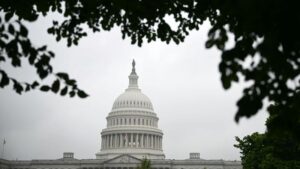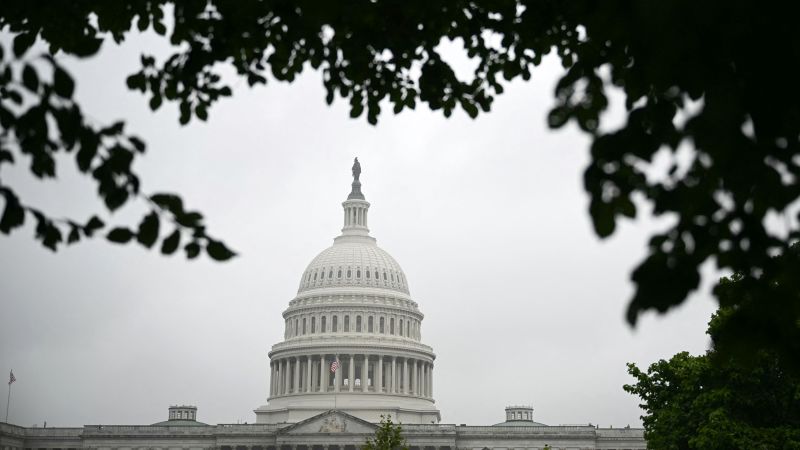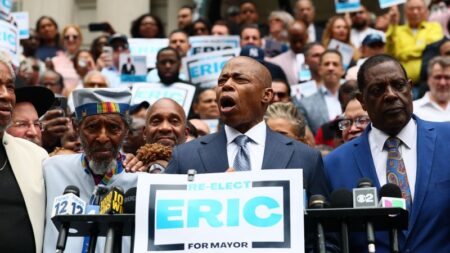For over a dozen years, Elizabeth MacDonough has been a prominent figure in the Senate, fulfilling the role of the chamber’s parliamentarian. In this position, she has acted as a nonpartisan enforcer of the Senate’s rules and precedents, fulfilling responsibilities that are often behind-the-scenes and advisory in nature. Her tenure has seen multiple changes in the control of the Senate, making her role even more significant as lawmakers navigate through various legislative challenges and political landscapes.
Recently, MacDonough found herself under attack from certain Republican senators who were dissatisfied with her guidance regarding their proposed significant tax and domestic policy bill. This legislation, which included several key elements of former President Donald Trump’s agenda, was complicated by MacDonough’s ruling that disallowed the inclusion of specific cost-saving provisions. The deadline set by Trump for passing this measure added urgency to the situation, exacerbating tensions within the Senate.
Among the critics, Oklahoma Senator Markwayne Mullin argued that the rejection of provisions requiring states to bear more Medicaid funding seemed politically charged. Similarly, Alabama Senator Tommy Tuberville took to the social media platform X to advocate for MacDonough’s removal, stating she “SHOULD BE FIRED ASAP.” This reaction underscores the high stakes involved as lawmakers push for their agenda amidst tight deadlines and party expectations.
Nevertheless, support for MacDonough emerged from other quarters within the GOP. Some senators defended her, acknowledging their disagreements with her rulings but insisting that they would abide by her decisions rather than pursue a vote to overrule her. South Carolina Senator Lindsey Graham articulated that he had “no intention” of questioning the parliamentarian’s authority, while Missouri Senator Josh Hawley remarked that there likely wouldn’t be enough votes to go against MacDonough’s ruling in the Republican-majority Senate. Alaska Senator Lisa Murkowski emphasized that they weren’t going to “throw the parliamentarian under the bus,” reflecting solidarity among certain Senate Republicans in the face of dissent.
Former President Trump also weighed in on the controversy during a Friday press briefing, commenting that while MacDonough had been “a little difficult,” there were aspects of her rulings he found acceptable. Trump’s nuanced criticism exemplifies the challenging nature of legislating in a divided Congress, where both party loyalty and respect for institutional processes are at play.
Since being appointed to her role in 2012 by then-Senate Majority Leader Harry Reid, MacDonough has navigated the complexities of Senate procedures. As the first woman to hold the position, she advises the Senate on the application of its rules and oversees the special budgetary processes that allow for legislation to pass with a simple majority, which is particularly crucial in situations where a filibuster may block legislation.
This unique role entails conducting a “Byrd Bath” — a procedure named after former Senator Robert Byrd — during which senators are advised on using budget rules to advance legislation. MacDonough’s decisions have drawn criticism from both sides of the aisle; she previously ruled against including a federal minimum wage increase in President Biden’s stimulus package in 2021, reflecting the challenging balance she must strike between supporting legislative goals and adhering to Senate procedures.
The practice of overruling the parliamentarian is approached with caution due to the potential erosion of the filibuster, a vital tool for minority parties. Past attempts to countermand the parliamentarian’s authority have often resulted in political consequences, making lawmakers wary of going down that path. Senate Majority Leader John Thune indicated a lack of intention to override MacDonough’s recent ruling, emphasizing the strategic deliberations that come into play in the Senate chambers.
The topic of MacDonough’s authority has also illuminated her lengthy career and history within the Senate. She began her journey in the legislative field after graduating from George Washington University and Vermont Law School, initially working at the Senate library and later editing the Congressional Record. Her extensive experience culminated in her appointment as parliamentarian, a role she has approached with a deep commitment to representing both the Senate and its traditions.
Throughout her time in office, MacDonough has handled significant events, including advising on the impeachment trials of Donald Trump and safeguarding electoral votes during the January 6 insurrection at the Capitol. Her tenure encapsulates the interplay between procedural integrity and the political imperatives that often challenge the legislative branch as it confronts pressing issues and differing ideologies.
Ultimately, the ability of lawmakers to unify and respect the institutional authority of the parliamentarian will continue to influence legislative outcomes as they seek to advance their agendas in a polarized environment. As the Senate grapples with pressing issues and political scrutiny, MacDonough’s role remains pivotal, resonating not just within the halls of Congress, but also as a symbol of the ongoing discussions about governance, power dynamics, and institutional fidelity in American politics.











